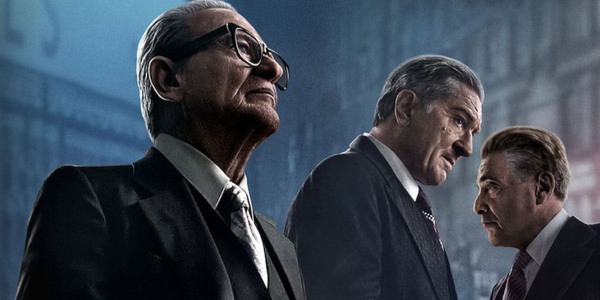By Rachit Raj
There is something beautiful, almost surreal, about veterans discovering and rediscovering themselves through their art in the twilight of their career. There is a sense of assurance in their work – the kind that comes only after having championed your field for decades. And yet, there is that desire to experiment with what is left of you, give a familiar trajectory something new and memorable.
The Irishman is a fabulous union of an army of stalwarts walking on familiar territory, soaking in their legacy, relishing in its nostalgia, and furthering their legend as artists who have together gone on to define the crime-mafia genre in the last few decades. It is a love-letter to their past, an ode to their magnanimous personas but eventually, it is a fantastic master-class of efficient, enthralling story-telling involving multiple strong characters who are all given enough space and time to shine in their respective moments through the course of the movie.
Adapted from Charles Bandt’s narrative nonfiction book I Heard You Paint Houses into a screenplay by Steven Zaillian, The Irishman tells the story of Frank Sheeran (Robert DeNiro) an American labour union member who was known to have contacts in the Bufalino crime family. The film largely revolves around Sheeran’s growing relationship with two men, Russel Bufalino (Joe Pesci) and James Riddle Hoffa, chronicling a careful death of Sheeran’s consciousness as he enters the world of crime and politics over the course of decades.
Using a de-aging technique, the film tries its best to give us a younger DeNiro, Pacino and Pesci. The result is not always accurate, but it is here that the brilliance of these seasoned actors comes through. The key to de-age is not in the prosthetics or make-up as it is in the actor imbibing the body language that matches the age of their character. The trio of DeNiro, Pacino and Pesci (DeNiro especially) carry their looks with the kind of easy body language that makes them believable even when they do not look their on-screen age consistently.
Beyond its crime-mafia world (which Scorsese knows the grammar of better than anyone else), The Irishman also uses nostalgia in multiple ways. With the familiarity of its tone with other revered Scorsese films like Goodfellas and Casino, Scorsese immediately touches on the nostalgia of his audience. He gives them a visual treat, a three-and-a-half-hour long joyride that takes them back to those movies and in essence to their former self who watched and enjoyed DeNiro and Pesci in those movies. Here we also have Pacino being his old, dynamic self to add to the overwhelming nostalgia. It is everything that you need to be knee deep in the memories of those movies.
In the narrative, Scorsese churns out the regret and inevitability of nostalgia as his final, penetrative glance at the crime world that has fascinated him and his cinema for years. Frank Sheeran, shown to us as a feeble, wheelchair-bound old man in the “present” of the movie is soaked in nostalgia. With years of seeing people around him die one-by-one and a strangled relationship with his daughter Peggy (Anna Paquin) that breaks him from inside, Frank is left with all the time in the world to look back at his actions. In a fantastic scene Dolores Sheeran (Marin Ireland) accuses Frank of not being able father to his daughters. DeNiro, who is fantastic throughout the film, is especially terrific here as he realizes that all his life has been simply a lead-up to this moment where one of his daughters refuses to talk to him and another blames him for not being there for them the way he should have been.
The film ends with Frank sitting alone in the room, far from his best days when he shared drinks with Russell and worked for Hoffa. It is a sad look of a man who feels detached from his acts as a younger man. Frank is the last man standing, alone in his reflection of what it was to be around Hoffa and Russell. There is not a lot of regret here, Frank as a character is too proud to feel remorse. What it is, though, is the realization of how futile he has become. In absence of death when everyone he worked for and with is dead, Frank is left with the natural demise of his panache. He is powerless, alone and all he has for company is the memory of the time he spent with men who defined what he became.
The final few minutes of The Irishman are slow, introspective and feel more personal than most of Scorsese’s crime films. There is always the inevitable fall of the hero in such narratives, but the fall in The Irishman is more internal. We do not leave Frank Sheeran behind bars. We leave him in a retirement home, alone and deprived of familial love. Life is a burden for him, a burden that he carries alone in the silence of his solitude, and it is in blending this cold sense of solitude with the magnetic charisma of Frank’s earlier adventures that The Irishman finds its echo of brilliance as a long, patient ode to Martin Scorsese’s legacy and the power of the moving image.







Leave A Comment
You must be logged in to post a comment.